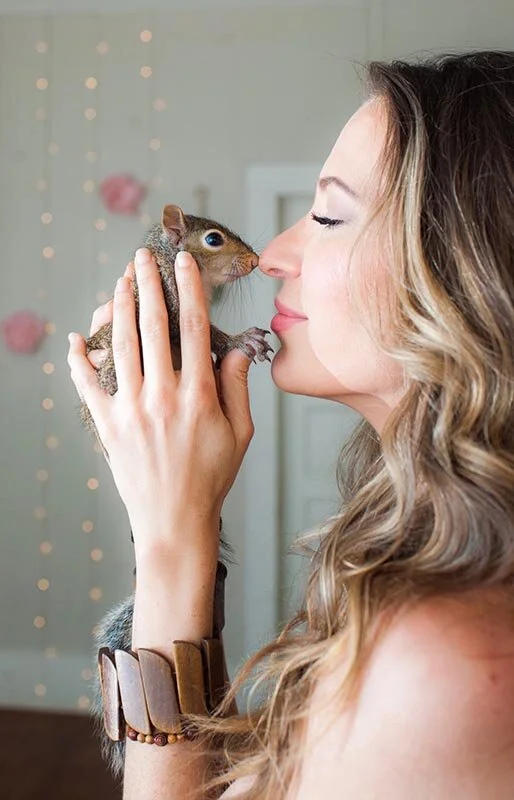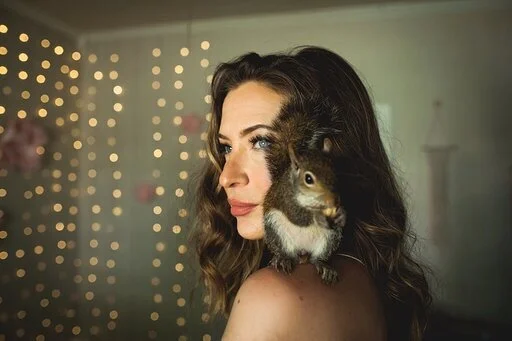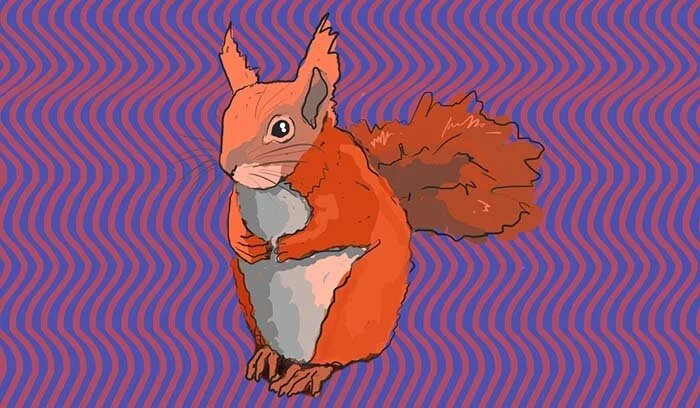The Heartbreaking Saga of Willa the One-Eyed Squirrel
Checking in on the orphaned baby squirrel two months after the state of Louisiana removed her from the care of the woman who nursed her back to health.
By Jessie Schiewe
Credit: Emily Istre
The one-eyed squirrel’s timing couldn’t have been more perfect.
Emily Istre found the injured baby animal in her mother’s backyard on March 14th, right around the time the U.S. was waking up to the fact that COVID-19 was a real and present danger that required immediate action. In seven days, the governor of Louisiana would issue a statewide stay-at-home order and Istre would get laid off from two of her three jobs. She didn’t know it then, but in the following weeks, her income would slow to a trickle and she’d start wondering how she was going to pay rent.
But on that fateful Saturday when she found the sickly creature alone and in need, Istre wasn’t thinking about the pandemic or the toll it would take on her finances. She just knew that she couldn’t let a baby die on her watch.
“I called a couple of numbers that I found on the internet and they didn’t call me back,” she told OK Whatever.
“And it’s not like I could have gone anywhere because it was right when quarantine started.
So I was like, OK, I’m just going to do it. I’m going to save this squirrel.”
The squirrel was young, probably no older than three weeks old, and was severely dehydrated with a a badly infected eye. If she hadn’t intervened, Istre is positive the squirrel would have died.
With the internet as her only resource, she began caring for the baby rodent, whom she named Willamina Ballerina Istre, or Willa for short. Over the course of the next month and a half, Istre nursed the squirrel back to health and the pair bonded like mother and child.
Nightly applications of Neosporin healed Willa’s infected eye and she quickly regained her strength, crawling up Istre’s legs and onto her shoulders whenever the human came near. The living room — which didn’t have a couch and was more like a storage space for Istre’s musical instruments — became Willa’s domain because of its ample windows and curtains for her to climb on. A friend of Istre’s even built the squirrel a custom wooden house, complete with a deer antler for when she started teething.
Routines between the two were established quickly. Bedtimes weren’t successful unless Istre cuddled Willa while singing her lullabies. Even though she had her own room, every night around 1 a.m., the squirrel would inevitably wake up and scratch on Istre’s bedroom door to be let in. Her favorite spot to sleep was right on top of Istre’s chest.
“In the morning, whenever she was ready to wake up, her little face yawning and her little paws reaching for my face was my favorite. It was insane,” Istre said. “And then she’d sit on my chest and look at me, and she’d put her little paws to her mouth and be like ‘Eat?’ ”
Yes, Istre also taught the squirrel some sign language.
“She knew how to ask for ‘more’ and ‘eat.’ We were working on ‘please.’ ”
Istre also created an Instagram profile for Willa (@one_eyed_willa) that eventually attracted the attention of TMZ which published an article about the unique pair.
Credit: Emily Istre
From the beginning, Istre’s intentions with Willa were to bring her back to good health and then return her to the wild. She’s done that with a few birds in the past. She’s also trapped possums in her backyard so that Animal Control could release them “in the woods, out of town, so that they don’t get attacked by dogs.”
Istre’s cat Elle — whom she kept separate from Willa so as to foster a healthy fear of larger animals in the squirrel — had also been a stray. Istre found her as a kitten by a gutter in New Orleans shortly before a thunderstorm hit.
“She was so tiny and her eyes were half-closed when I found her,” Istre said. “I had no intention of keeping her, but we bonded.”
The same thing happened with Willa.
“I didn’t think that I was ever going to want to keep her or that she would want to stay. But I just didn't expect the connection that we had. I love every animal and, of course, once you take care of something you bond with it and want to see it do well, but with her, it was just, like, crazy. She was my baby.”
Gray squirrels can be found in almost every mainland state in the United States, yet in only three states (Arkansa, Colorado, and Indiana) is it legal to keep one as a pet.
In Louisiana, it is against the law to keep a squirrel unless you have first obtained a permit through the state’s Department of Wildlife & Fisheries or if you are a licensed wildlife rehabilitator.
It is, however, perfectly legal to hunt and kill squirrels during most months of the year, as well as to keep their bodies as trophies.
“I just think it’s insane,” Istre said. “So you can hunt and kill squirrels in Louisiana but you cannot help them unless you’ve paid your money to the state to take their classes and become a licensed rehabber?”
Istre had been well aware of her state’s laws pertaining to squirrels from the beginning, so on the day when the Department of Wildlife & Fisheries finally gave her a call, she led with: “I’ve been expecting you.”
Credit: Emily Istre
“I figured they were coming. After the whole TMZ thing, everyone was reaching out telling me that squirrels are illegal in Louisiana. And I was like, Well, it was the middle of a pandemic and I don’t want to break the law but I was also not going to let a baby die.”
In the aftermath of Willa’s removal from her care, Istre has heard many people say that the squirrel was seized by the state. But that, she said, is not true.
Instead, Istre spoke with Melissa Collins, the permit coordinator for the agency, who broke the bad news over the phone.
“She said: ‘I can’t write you a permit. You’re not a licensed rehabber, so you can’t keep her,’ ” Istre recalled.
Willa would be put in the care of Tails of Nature, a licensed wildlife rehabilitation center, that would slowly prepare the squirrel for life outdoors on their private property with other squirrels. Collins gave Istre one last day with Willa before she was required to bring her to their facility.
Ultimately, Istre said the only reason she complied was for Willa’s sake.
“Trust me when I tell you, I at least entertained every idea and possible scenario,” she said.
But in the end, “I didn’t want trouble and I didn’t want her to die, to be euthanized or anything like that, because of me not complying. That’s the only reason I did it.”
Willa was taken to the rehabilitation facility on April 23rd, exactly 41 days after first coming into Istre’s care. Their farewell was as painful as you’d imagine, with Istre spending four hours at the facility, struggling to comfort the frantic baby squirrel.
Credit: Emily Istre
“When I finally had to put her in the cage, she was throwing herself against it, trying to get to me. I was crying. I had an old t-shirt that I put in the cage with my smell on it that I was trying to cover her with because she was so freaked out. And then held onto one of the cage’s bars, and she put her little hand on her chest like she was saying ‘please.’ Like she was saying, ‘Momma, please take me out of here.’
It was horrible. To date, I’m 37-years-old and that was one of the worst experiences of my life. It felt like I had to give up my child.”
Adjusting to life without Willa has not been easy for Istre. The immediate aftermath of it consisted of “super dark days,” filled with a lot of crying and avoidance of her living room which used to be Willa’s. For a while, her internal clock would wake her up every night around 1 a.m., the time that Willa would try to sneak into her bed.
“I’d just be half-asleep, waiting for her to jump on me, and then it would come to me and I’d wake up and be like, She’s not here! It was such a painful, hurtful experience. It just felt like part of my heart had been pulled out of my chest.”
Istre has at least found some relief through the photos and updates of Willa that the rehabilitation facility sends her when they can. She knows that Willa’s eye, which has now been examined by a doctor, is healing well if not better than they expected. The squirrel has also put on some weight and grown slightly. She’s also been spending time with another orphaned baby gray squirrel that was brought into the facility around the same time.
The main hurdle, if you can call it that, will be teaching Willa to be less domesticated.
“Willa was so spoiled rotten. She always wanted to be held. If I’d put her down, she would run to be right back on me in 2.5 seconds. So she will be more challenging to get to be wild,” Istre explained. “But once her hormones kick in, she should “wild up” like normal, as they say. She will want more independence. It’s really a good situation for her. Her rehabber is so good and I can tell she really cares about her. Knowing this has helped me sleep easier.”
As for how Wildlife & Fisheries first learned about Willa’s existence, Istre is pretty sure she knows the culprit: It was the Instagram profile she created for the squirrel.
Still, she doesn’t have regrets about making it. Not only did it provide comfort and release for Willa’s many followers who needed a distraction during the early weeks of the pandemic, but it now serves as a digital scrapbook of her time with the one-eyed squirrel — one that can never be lost or erased, even if she happens to misplace her phone (which she claims she never backs up).
As stay-at-home restrictions loosen across her state, Istre has become busy again with work and other commitments, which has proven to be a welcome distraction. But she still thinks about Willa everyday.
“There’s no doubt in my mind that she was sent exactly when I needed her. We were exactly what each other needed at that time. As much as I helped keep her alive, she helped keep me alive,” she said.
“Like, how many people get to raise a baby squirrel and have her love them so much? And get to see and feel that unconditional bond and depth of love? I’m not a mother and I’m not a wife. I’ve never had that. But to have that sort of love was just so…”
Istre is still licking her wounds, as Willa no doubt is, too. But hopefully, with time, they’ll each be able to mend their pain. Willa will become more wild, living a safe but cage-free existence outdoors, and Istre will once again return to being the preternaturally busy social butterfly she was before she found the one-eyed squirrel.
Looking back, there is nothing Istre would have done differently. In fact, if the opportunity to save a wild animal arises again, she’ll deal with it exactly the same way — just one with minor addition.
“I’m never going to leave an animal in need, no matter what. If it is within my capabilities to help an animal, then I will,” she said. “But now I at least have resources and information and people to call.”
(Editor’s note: If this story moves you and you care about the future health of Willa the One-Eyed Squirrel, please consider donating to Tails of Nature, the nonprofit wildlife rehabilitation center where she is being cared for and will spend the rest of her life. Simply head to their Facebook page and click the “Donate” button on the righthand side.)









